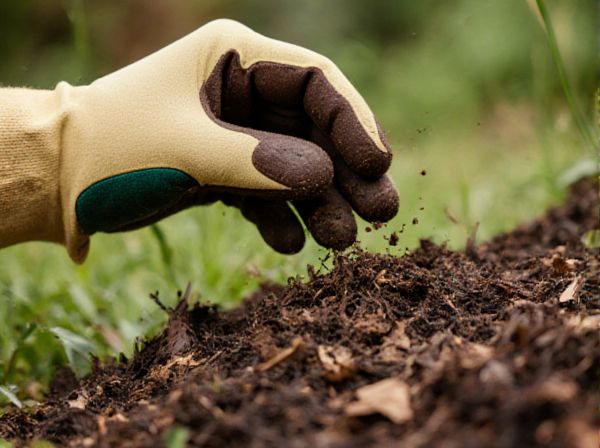
Natural mulch vs plastic mulch Illustration
Natural mulch enhances soil fertility, retains moisture, and supports beneficial microorganisms, promoting healthier plant growth without environmental harm. Plastic mulch effectively suppresses weeds and conserves soil temperature but contributes to plastic waste and lacks biodegradability. Choosing natural mulch offers sustainable benefits by enriching the ecosystem while reducing pollution compared to plastic alternatives.
Table of Comparison
| Feature | Natural Mulch | Plastic Mulch |
|---|---|---|
| Material | Organic materials like straw, wood chips, leaves | Polyethylene or biodegradable plastic sheets |
| Soil Health | Improves soil fertility and microbial activity | No improvement; may inhibit soil aeration |
| Moisture Retention | Moderate retention with gradual drying | High retention, reduces evaporation |
| Weed Control | Effective but may allow some weeds | Highly effective, blocks most weeds |
| Decomposition | Biodegrades, adds organic matter | Does not decompose, requires removal |
| Environmental Impact | Eco-friendly, sustainable | Potential plastic pollution, less eco-friendly |
| Cost | Lower initial cost, may require frequent replacement | Higher initial cost, durable over season |
| Usage | Ideal for organic farms and gardens | Common in commercial crop production |
Understanding Natural Mulch and Plastic Mulch
Natural mulch, derived from organic materials like wood chips, straw, or leaves, enhances soil fertility, retains moisture, and supports beneficial microorganisms, promoting healthier plant growth. Plastic mulch, composed of polyethylene or biodegradable polymers, primarily functions to suppress weeds, regulate soil temperature, and conserve moisture but does not contribute nutrients to the soil. Understanding the distinct properties of natural and plastic mulch helps gardeners and farmers choose the appropriate mulch type for sustainable crop production and soil management.
Key Benefits of Natural Mulch in Organic Gardening
Natural mulch in organic gardening enhances soil fertility by gradually decomposing and adding essential nutrients, promoting healthy microbial activity. It improves moisture retention, reducing water evaporation and supporting consistent soil hydration for plant roots. Natural mulch also helps suppress weeds without harmful chemicals, maintaining a sustainable and eco-friendly garden environment.
Advantages and Drawbacks of Plastic Mulch
Plastic mulch offers advantages such as improved soil temperature regulation, enhanced moisture retention, and effective weed control, which can lead to higher crop yields. However, drawbacks include environmental concerns due to non-biodegradability, disposal challenges, and potential soil health degradation from reduced organic matter incorporation. Balancing these factors is essential for farmers considering plastic mulch in sustainable agricultural practices.
Impact on Soil Health: Natural vs Plastic Mulch
Natural mulch improves soil health by enhancing microbial activity, increasing organic matter, and promoting moisture retention, which fosters nutrient-rich, fertile soil. Plastic mulch, while effective at weed control and temperature regulation, can hinder soil aeration, reduce microbial diversity, and cause plastic residue accumulation, negatively impacting soil structure. Choosing natural mulch supports long-term soil sustainability and ecosystem balance, essential for organic farming systems.
Weed Control Efficiency: A Comparative Analysis
Natural mulch, composed of organic materials like straw or wood chips, enhances weed control by blocking sunlight and enriching soil nutrients, promoting healthier plant growth. Plastic mulch, often made from polyethylene, effectively suppresses weeds by creating a physical barrier and retaining soil moisture but lacks nutrient contribution. Comparative studies indicate natural mulch supports long-term soil health while plastic mulch offers immediate and consistent weed suppression, crucial for intensive crop management.
Water Retention and Moisture Management
Natural mulch enhances water retention by absorbing and slowly releasing moisture into the soil, creating a stable environment that reduces evaporation and conserves water. Unlike plastic mulch, which can sometimes cause water runoff or restrict moisture penetration, organic mulch promotes better soil aeration and moisture regulation. This improved moisture management supports healthier root development and efficient water use in sustainable gardening.
Environmental Impacts of Mulch Choices
Natural mulch, composed of organic materials like wood chips and straw, enhances soil health by improving moisture retention and promoting microbial activity, thereby reducing the need for synthetic fertilizers. In contrast, plastic mulch, often made from polyethylene, contributes to soil pollution and microplastic contamination due to its non-biodegradable nature and disposal challenges. Choosing natural mulch supports sustainable agriculture by minimizing carbon footprint and fostering biodiversity, while plastic mulch raises concerns about long-term soil degradation and waste management.
Cost and Long-Term Investment Considerations
Natural mulch typically involves higher initial labor costs but offers long-term benefits through improved soil health and moisture retention, reducing the need for frequent replacements. Plastic mulch requires lower upfront labor and provides immediate weed control but often incurs recurring expenses due to disposal and environmental impact mitigation. Evaluating long-term investment favors natural mulch for sustainability and soil fertility, while plastic mulch may appeal to growers prioritizing short-term cost efficiency.
Best Practices for Applying Natural and Plastic Mulches
Natural mulch, such as straw, wood chips, and leaves, improves soil health by enhancing moisture retention and nutrient cycling while suppressing weeds. Plastic mulch excels in temperature regulation and weed control but requires proper installation to prevent soil erosion and ensure adequate drainage. Best practices for applying both mulches include thorough soil preparation, consistent mulch thickness of 2-4 inches for natural materials, and secure anchoring for plastic films to optimize plant growth and soil protection.
Making the Eco-Friendly Choice for Your Garden
Natural mulch, made from organic materials like wood chips, straw, or leaves, enhances soil health by improving moisture retention, promoting beneficial microbial activity, and reducing erosion. Plastic mulch, while effective at weed suppression and temperature regulation, can contribute to environmental pollution due to its non-biodegradable nature and disposal challenges. Choosing natural mulch supports sustainable gardening practices by enriching soil fertility and minimizing ecological impact, making it the preferable option for eco-conscious gardeners.
Natural mulch vs plastic mulch Infographic

 gardendif.com
gardendif.com